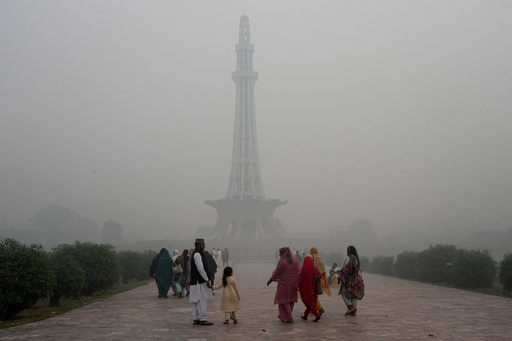
LAHORE, Pakistan — In response to a severe haze engulfing eastern Pakistan, authorities have made the decision to close all public parks, zoos, museums, historical sites, and playgrounds for a period of ten days. This action comes as an unprecedented smog wave negatively impacts 18 districts in the Punjab province, affecting the health of tens of thousands of residents.
Residents of Lahore, a city with a population of 14 million, have been forced to navigate their daily lives under a darkening shroud of pollution that has persisted for extended periods, resulting in visibility plummeting to approximately 100 meters (about 109 yards).
The toxic air has dominated Lahore and other areas within Punjab since the previous month, prompting government officials to shut down schools and various public venues until November 17. Additionally, employees across 18 districts, including Lahore, have been instructed to remain at home.
Sajid Bashir, the spokesperson for the Punjab Environment Protection Department, stated that these regulations prohibiting public access to certain areas are essential to safeguarding community health. “Our goal is to encourage individuals to limit their travel and stay indoors as much as possible,” he explained.
Furthermore, a Lahore court has mandated that all marketplaces must close by 8 p.m. Authorities have also put measures in place banning barbecuing without filtration systems and requiring wedding venues to shut by 10 p.m.
Bashir reported that Lahore was ranked as the most polluted city worldwide last Friday, with Air Quality Index readings surpassing 600. Any level beyond 300 is deemed harmful to health.
Schools in the affected regions were previously closed to ensure the well-being of children, with disruptions expected to impact over 20 million students, according to various associations representing both public and private institutions.
Despite the current crisis, Bashir expressed hope for an improvement in air quality in the coming week.
Nonetheless, the ongoing situation has already resulted in widespread illness among Lahore’s populace. On Wednesday, the province recorded an exceptional Air Quality Index reading exceeding 1,100. In response, Marriyum Aurangzeb, a senior Punjab government minister, urged residents to wear masks and minimize travel, warning that the government may be forced to implement a full lockdown if conditions do not improve.
According to the international organization Save the Children, millions of children will be unable to attend school due to the closures until November 17. Khuram Gondal, the organization’s country director, has called on the authorities to take immediate action on air quality issues and pursue long-term strategies, emphasizing the need for a healthier environment for future generations.
